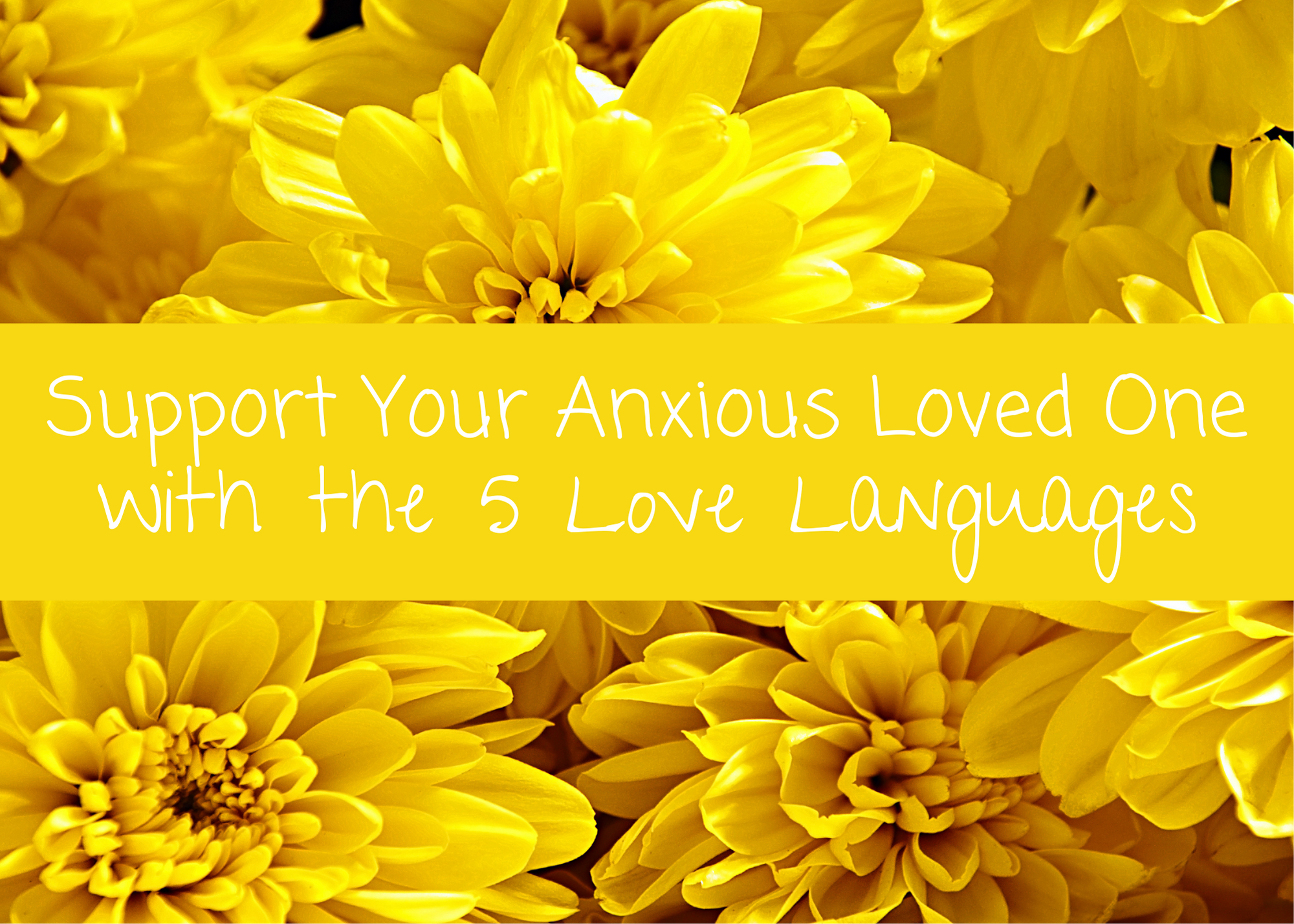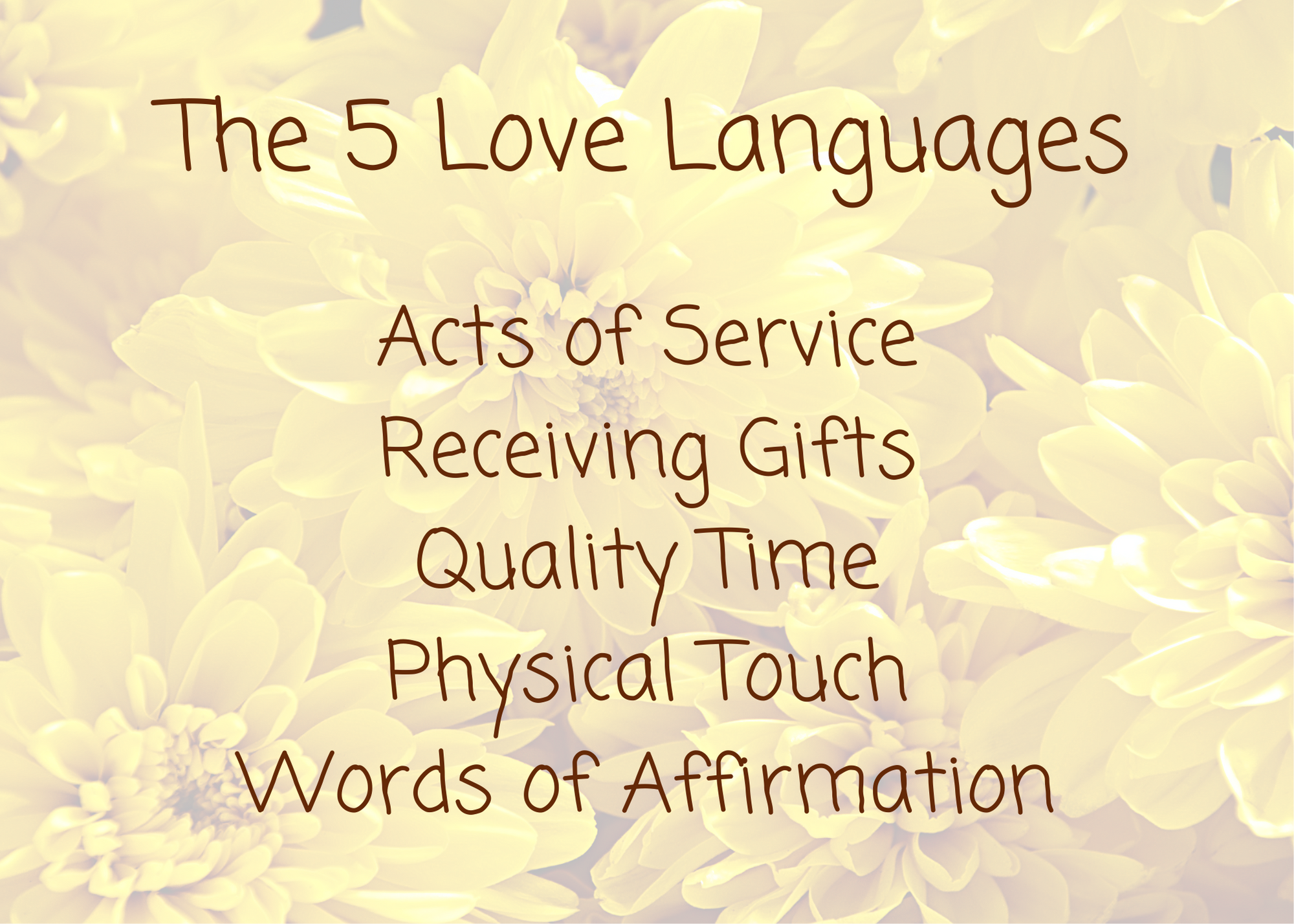Support Your Anxious Loved One with the 5 Love Languages
Are you wondering how you can help someone with anxiety? It’s difficult watching your partner, friend, family member, or co-worker suffer from crippling worry and panic. You don’t like to see people you care about experience pain, of course, but you also might feel the burden of trying to support a person bursting with negative emotions. It’s a heavy weight to carry, helping a loved one with mental illness or anxiety disorders. But you’re a wonderful person for doing your best to manage the emotional load and find healthy ways to help another person survive difficult times.
So, how can you help? There is no one size fits all solution to helping someone with anxiety because every person on this earth is different. Individuals cope with anxiety in their own distinctive way, and they prefer to receive love and support in a unique manner, too. A beautiful way you can help someone with anxiety is by matching your support with their preferences, communication style, attachment style, and love languages!
Mental Health Blog Disclaimer
I am not a medical professional, therapist, or mental healthcare professional. The information provided on this website is for informational purposes only, comes from my own personal experiences, and may be read, interpreted, and practiced at your own risk. Do not rely on this information as a substitute to medical advice or treatment from a healthcare professional.
The 5 Love Languages
Love languages are how people prefer to give and receive love. These five methods of love include acts of service, quality time, physical touch, receiving gifts, and words of affirmation. Though they are commonly associated with romantic relationships, love languages can be extended to all relationships! By recognizing and adapting to your loved one’s love languages, you’ll be better equipped to help solve problems, lend advice, identify conflicts, and grow closer.
Determine your own and your loved one’s favored love languages with theLove Language test to discover how everyone involved in this effort appreciates giving and receiving love. Then, read on to learn how to apply love languages as anxiety support.
Use The 5 Love Languages to Help Someone with Anxiety
Quality Time
This love language represents giving your loved one your undivided attention and spending time with them.
Give them your undivided attention and listen.
Offering your undivided attention and listening skills to an anxious human is one of the kindest, most supportive things you can do! (Quality time is my number one love language, so perhaps I'm biased.) The ultimate act of love and therapy for one who values quality time could be devoting time to lending an open and engaged ear. Be present. Put away your phone and mindfully listen to their venting, emotional stories, or however else they choose to express and cope with their anxiety.
Join them in their hobbies.
Dedicate your time to doing what your loved one treasures doing. Engaging in a lovable hobby encourages self care, relaxation, and well-deserved time away from whatever is causing negative emotions. One who appreciates quality time will feel extra loved and cared for when you give your time and energy to their favorite activities.
Be present.
Be present. Put away your phone and mindfully listen to their venting, emotional stories, or however else they choose to express and cope with their anxiety.
Words of Affirmation
This love language involves the use of words to affirm or reassure others.
Validate their feelings and provide verbal reassurance.
Reassure your anxious partner that everything is okay and you’re here to help. Affirming their safety, worth, and capabilities are helpful ways to soothe someone who is feeling anxious. Additionally, validating their feelings is a gentle reminder that it’s okay to not feel okay, and negative emotions, like anxiety, are normal human emotions. With your affirmative words, encourage them to just feel. Anxiety might not feel comfortable, but sometimes this emotion has a lot to teach us.
Verbally express your love and concern.
In a kind manner, let your loved one know you care about them. Share sweet words like,
“You mean a lot to me,”
“I care about you,”
“I’m here for you,” and
“You’re not alone.”
You can also show your concern by asking gentle questions about how they’re feeling, what types of self care they’ve been practicing, or what’s been weighing them down lately. If you deliver productive mental health questions effectively, your concerned words can showcase your love for someone who responds well to words of affirmation. Lead them down a road of healing with loving remarks.
Offer support by asking what they need.
If you’re unsure of what your loved one needs to minimize their anxiety, ask them! Here are some examples of how you can begin this conversation about their mental health journey.
“How can I best support you right now?”
“How have you been feeling lately?”
“Is there anything you want to talk about?”
“Do you want to do something to take your mind off things?” (Cue quality time.)
Point out habits or triggers that lead to anxiety.
If you and your loved one have a productive conversation about anxiety triggers or bad habits they want to avoid, offer to help hold them accountable. With their consent, you could help gently point out the cause of their negative thinking patterns as you observe their behavior or external triggers. Then, you can help redirect their thoughts down a more realistic, positive path.
Give them positive reinforcement.
Acknowledge their accomplishments as they go through and grow through anxious times. Give them a high five for combating negative thinking patterns, making time for self care, or even getting out of bed that day! Your encouragement has the power to transform your loved one’s negative thinking patterns into positive thinking patterns if they’re willing to practice forming this healthy habit. A positive outlook on emotions can change the life of a person suffering from mental illness. Encourage your anxious loved one to embrace all of their emotions because emotions can be superpowers! With an optimistic perspective, anxiety can be channeled into fuel and motivation, and it's crucial to remind others of this fact.
Acts of Service
Actions speak louder than words for some people, and this love language represents performing services for others.
Assist them with tasks that are stressing them out.
An anxious person who values considerate acts of service might appreciate you taking a load off their shoulders. If their anxiety is caused by stress or too many duties on their plate, try cleaning up the house, making dinner, taking care of the kiddos, or other tasks weighing them down. Your loved one deserves some help getting shit done!
Cook a meal for the foodies.
Who doesn’t appreciate a fully prepared, hot and ready meal? The way to many people’s hearts is FOOD. Lean on that knowledge, and go out of your way to prep a delicious and nutritious breakfast, lunch, dinner, charcuterie board, or dessert for that struggling, anxious human in your life.
Be the best cognitive behavioral therapist you can be.
This grand act of service also combines quality time and words of affirmation. If you have put in the time and energy to educate yourself about mental health and behavioral techniques that help combat negative emotions, give your advice and support a go! This act will likely be a heartfelt and thoughtful kickstart to anxiety recovery for those who appreciate these three love languages. I live with an anxiety disorder, and these are my top three love languages. When the people in my life pause to listen, offer words of encouragement, and operate as my makeshift mental health therapist, I feel enveloped with love! Yay for this type of anxiety support!
Please note that offering advice should come when someone asks for it. You could start by clearly asking, “Do you want my advice?” If you receive a “yes," then go for it! Be careful not to offer advice to someone who is not in a place where they can accept new ideas, suggestions, or advice.
Receiving Gifts
The lover of this love language most appreciates a thoughtful gift.
Give them a self care gift package.
Picture it now, gift lovers: a sweet self care basket composed of a lavender candle, a self help book, fuzzy socks, and a eucalyptus bath bomb. A sentimental care package is a supreme form of love and anxiety support for someone who values gifts!
Hide small sweet chocolates or a note in their coat pocket.
Sometimes, the sugary little things make a huge difference in our anxiety-filled days. Wipe that anxious thought clean away from your loved one’s brain with a sweet reminder that they are adored. Chocolate can fix anything!
Physical Touch
The person who appreciates this love language feels most loved by the appropriate physical affection.
Wrap them up in a warm hug or give their hand a squeeze.
Physical closeness is a tangible reminder of human connection. To be swept up in a hug is to be literally uplifted, and to be wrapped in a warm hug is to be literally protected. Understand and respect the suitable type of physical touch your loved one prefers. A physical, concrete gesture can go a long way for someone suffering from anxiety who desires this love language.
Be physically near them.
Anxiety disorders can make people feel lonely or disconnected. Position yourself physically near your loved one so they can see with their own eyes that you are right there to help. Even sitting in silence in the living room on opposite sides of the couch can be a strong act of love for those who value physical affection and closeness.
Give them a backrub or enjoy physical intimacy.
If your anxious loved one is someone you’re in a romantic or physically intimate relationship with, perhaps an intimate moment will help relieve them of their stress. Did you know that massages and sex release both muscle and brain tension? These physical acts often intertwine with quality time or acts of service and can be powerful performances of tenderness, stress relief, and connection.
Now, go express all your love!
I love this creative approach to combating the anxiety that accompanies mental illness! The concept of the five love languages can be a powerful tool for navigating negative emotions and promoting a healthy, flourishing connection between you and a loved one who is suffering.





Anxiety can serve as a roadblock on the days we have just as much to worry about as we do things we need to get done. Learn how to manage anxiety when it is stealing your attention from your responsibilities.